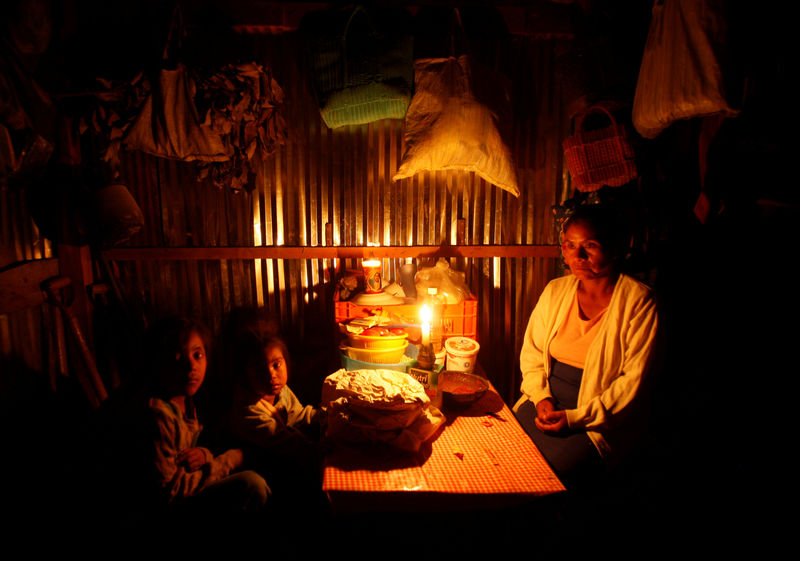By Stefanie Eschenbacher and Anna Irrera
MEXICO CITY/NEW YORK (Reuters) - Mexico's new leftist government is betting on financial technology to help lift people out of poverty.
The administration of President Andres Manuel Lopez Obrador recently announced measures aimed at making financial services more affordable in a nation where more than half the population is unbanked.
It is planning a digital payments system run and built by the central bank that will allow Mexicans to make and receive payments through their smartphones free of charge. A pilot roll-out for the platform, known as CoDi, is expected by March.
"In the future, it will no longer be necessary to have a bank in the sense of a traditional, established bank," said Arturo Herrera, Mexico's deputy finance minister. "Mobile phones will become banks."
Phone-based banking has proven a hit among the poor in other emerging markets such as China, India and Kenya. Those efforts have been driven by private sector companies that offer user-friendly, affordable apps.
Whether Mexico's state system will prove as nimble and easy to use remains to be seen. And it will initially require help from the very same banks that for decades have shut out low-income Mexicans with pricey fees.
Other hurdles include Mexico's spotty telecoms. While cell phone and internet coverage have improved in recent years, basic infrastructure is still missing in many remote areas.
“Mexico has a lot of the key ingredients to succeed, but it's not plug and play," said Monica Brand Engel, a partner at Quona Capital, a global venture capital firm that invests in fintechs focused on the unbanked in emerging markets.
CATCH-22
An estimated 42 million Mexicans lack bank accounts. Steep fees and past scandals have put many off the country's mainstream banks. Many shun accounts to stay off the radar of tax collectors.
That hobbles Mexico's growth. Coffee farmer Martin Romero is a prime example of why.
His small town in the state of Oaxaca, one of Mexico's poorest, has no bank branch. Romero is paid in cash. He travels hours to pay bills and is unable to save or borrow for larger expenses.
"Of course I would like a bank account," Romero said. "That way we could save at least a little of what we earn."
(For a graphic on financial inclusion in Mexico, see https://tmsnrt.rs/2IhXe8R)
While many Mexicans applaud Lopez Obrador's push, some fintech executives are grumbling about getting shut out of the loop.
To use CoDi, consumers must have an account with an institution participating in Mexico's existing interbank payments system, which will power the new platform.
Jaime Cortina, director of operations and payments at the central bank, said the goal was to develop a payment method that Mexicans could use to make payments between each other, in shops and online.
Current members of the system include established institutions such as BBVA's Bancomer, Banco Santander (MC:SAN) and Citigroup (NYSE:C) Inc's Citibanamex. Fintechs that want to join need an electronic payment institution license, a process that new players fear could take up to a year.
That presents unbanked Mexicans with a bizarre Catch-22: To access the government's free mobile payments system, at least initially, they would have to open accounts with banks that many do not want to join or cannot afford in the first place.
Adolfo Babatz, CEO of payments startup Clip, said Mexico's government should be looking to fintech entrepreneurs to bring true innovation to the financial system, not banks that have benefited from high barriers to entry. His Mexico City-based company has created a low-cost mobile credit card reader that fits on smartphones.
Mexico should "look at the examples from the rest of the world," Babatz said.
In Kenya, for example, mobile payment system M-Pesa was launched in 2007 by a private company, mobile network operator Safaricom. M-Pesa is now a surrogate bank account for millions of users. In China, hundreds of millions of previously unbanked consumers have flocked to Alipay, the payment app owned by Alibaba (NYSE:BABA) affiliate Ant Financial.
GRAY ECONOMY
Low-cost banking alone may do little to lure Mexicans out of the shadows. Nearly 57 percent work off the books, according to government data. An estimated 90 percent of transactions are done in cash.
"People who work and live in the informal economy do not want to be taxed," said Carlos Lopez, director for retail strategy and new digital business at Mexico's largest bank, BBVA (MC:BBVA) Bancomer.
Herrera, the deputy finance minister, told Reuters the government is making efforts to reduce cash in circulation to cut down on money laundering and corruption, and to draw more people into the formal economy.
He said the administration plans to transition to direct deposit or digital wallets to dispense welfare benefits over the next 18 months. At present, many Mexicans rely on government-issued cards that can be used at ATMs to withdraw their benefits in cash.
He also expressed optimism that fintechs would bring needed competition to the money transfer business, reducing the cost of remittances sent home by Mexicans abroad.
But even in cosmopolitan Mexico City, a future of cashless payments seems far off for people such as Paula Martinez. She sells traditional sweets, chewing gum and single cigarettes from a wooden basket in the fashionable Roma neighborhood.
The mother of three does not have a bank account, and says she and her husband have never considered it.
"We don't earn enough," Martinez said.
